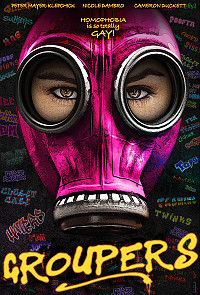| SHADOWS ON THE WALL | REVIEWS | NEWS | FESTIVAL | AWARDS | Q&A | ABOUT | TALKBACK | |||||||||||||||||||||||||||||
 Shadows off the beaten path Shadows off the beaten pathIndies, foreigns, docs, revivals and shorts...
On this page:
GROUPERS |
HARPOON |
IMPERIAL BLUE
| |||||||||||||||||||||||||||||
| See also: SHADOWS FILM FESTIVAL | Last update 15.Sep.19 | |||||||||||||||||||||||||||||
|
Groupers Review by Rich Cline | 
| 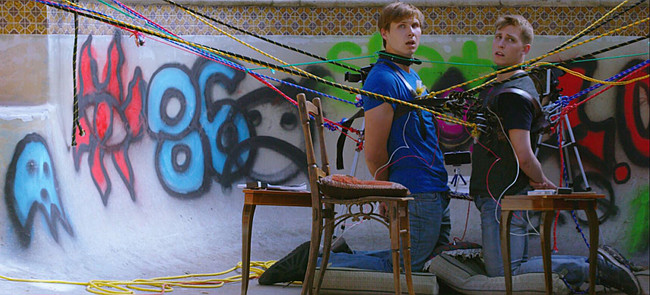 This blackly comical horror tackles homophobia with a high concept, as the title is slang for someone who changes sexual orientation later in life. With a limited number of characters in a single location, it sometimes feels like a stage play, with pointed dialog spoken by people with big personalities. Then about halfway in, the plot begins turning, abandoning nuance to become a trashy thriller. After picking up drunken teens Brad and Dylan (Mayer-Klepchick and Duckett) in a bar, Meg (Dambro) drugs them and ties them up in an empty swimming pool at an abandoned isolated house. She selected them because they were inflicting homophobic terror on gay kid Orin (Pudles), Meg's little brother, who recently attempted suicide. Now she's using them for her thesis project, an experiment to prove what they believe: that sexuality is a choice. But there are other people roaming around in this neighbourhood, including the house's owner (Wentz), who doesn't find this amusing. Meg is live streaming her absurdly elaborate plan to torment them both physically and psychologically, pushing their friendship to the limit. Her Chinese finger-trap devise seems particularly random. A flashback reveals how the boys headed out with fake IDs and a goal to seduce a cougar. And just as things begin to get interesting in their bound-up interaction, the story shifts gears, adding other perspectives. This diverts the focus away from homophobia, playing with but never quite grapple with drugs and mental illness. Dambro has a lot of fun as Meg, who is smug and annoying around her captives then reveals her nervousness when she's out of their sight. Mayer-Klepchick gives Brad an entitled air of arrogance, while Duckett is hilarious as the outrageously dim Dylan. Much less effective is Pudles' Orin, who is out for revenge and becomes villainously unhinged. There are also three overacting nutcases (Stanberry, Reed and Ioakimedes) who bring more random insanity to the dragged-out final half hour. As does Wentz as a no-nonsense thug. The bigger themes in this movie make it impossible to dismiss, even as it begins to meander in an attempt to "prove" the obvious (sexuality isn't always chosen, homophobes are often repressed). The way writer-director Cowan continually cuts away and cycles back into the story from another angle begins to feel distracting, removing tension from the central plot in order to stir in more mayhem. The issue remains the same, circling issues of bigotry, hatred and fear, but the resonance fades as things become increasingly messy.
|
| Harpoon Review by Rich Cline | 
| 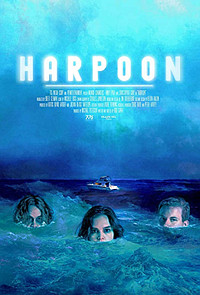 dir-scr Rob Grant prd Michael Peterson, Kurtis David Harder, Julian Black Antelope with Munro Chambers, Emily Tyra, Christopher Gray, Kurtis David Harder, Rob Grant, Michael Peterson, Rob Spina, Ron Webber narr Brett Gelman release Can Jul.19 fiff, UK Aug.19 ff, US 13.Sep.19 19/Canada 1h23 
| 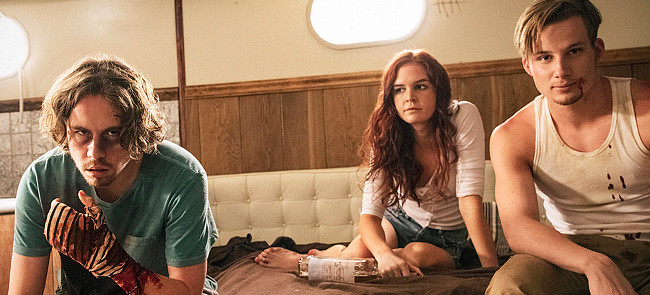 Brett Gelman delivers a knowing narration that establishes this horror thriller's comical tone right from the start, adding snide commentary as he describes the strained relationship between three longtime friends who are at sea literally and metaphorically. The film is strikingly shot, writer-director Rob Grant layers in strong undercurrents that keep the story staggeringly tense, and the three lead actors are terrific. Privileged, wealthy Richard (Gray) jumps to the wrong conclusions when his best pal Jonah (Chambers) and his long-term girlfriend Sasha (Tyra) conspire to buy him a speargun for his birthday. Once he calms down, Richard takes them out for a day trip on his yacht The Naughty Buoy. After some fishing, sunbathing and of course drinking, the messy connections between them begin to fray again. Then when violence flares up, an uncomfortable standoff ensues before they realise that they're stranded at sea with no working radio and a ludicrously small supply of food and water. The narrator offers back-story for the characters, including Jonah's messy relationship with his late parents, Richard's short-fused explosions of rage and Sasha's attempts to keep Richard from killing Jonah. As details emerge about their history together, things become increasingly knotted. The narrator also outlines bad luck they brought with them, changing a friendship into an act of survival. And the script continually drops revelations that propel things in unexpected directions. With only three unlikeable characters, the film relies on textured performances. Each actor brings much more than the key characteristics, cleverly playing with the choppy interconnections. Gray storms through each scene, erupting with uncontrollable anger that makes him feel capable of anything. But there's also some charm deeply buried inside. Tyra makes Sasha a force of nature, becoming the lynchpin in this desperate trio. And Chambers finds some intriguingly offbeat angles to the hapless Jonah, whose story takes a few startling turns. Intriguingly, this isn't about a shifting balance of power, it's about friends who betray each other then are forced to deal with the issues that has raised. They can't just react and then move on, they must actually confront their feelings about each other and their lives. While remembering to include proper gross-out nastiness, Grant isn't just making a survival thriller like Adrift or Open Water. With its reference to The Narrative of Arthur Gordon Pym of Nantucket by Edgar Allan Poe, this is much more of a blackly comical psychological horror that continually subverts expectations about the nature of love and friendship.
|
| Imperial Blue Review by Rich Cline | 
| 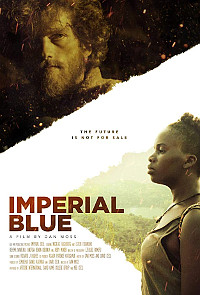 dir Dan Moss scr Dan Moss, David Cecil prd David Cecil, Semulema Daniel Katenda with Nicolas Fagerberg, Esther Tebandeke, Rehema Nanfuka, Andrew Benon Kibuuka, Abby Mukiibi, Nalubiri Ruth, Paul Dewdney, Kayiwa Nicholas, Kyeyune Isaac, Dumba Amina, Amanda Dahl, Kai Sunny Dirnberger release US 15.Jan.21, UK 29.Jan.21 19/UK 1h30 
| 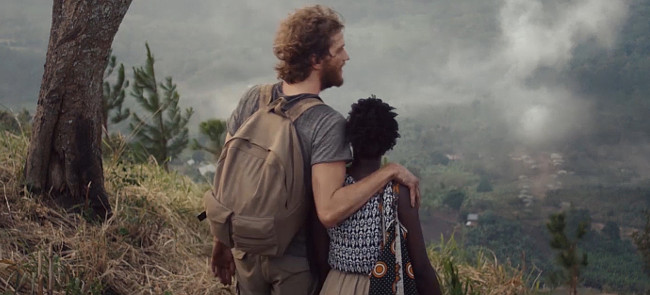 Traversing three continents, this British thriller is seriously ambitious, perhaps too much so for these inexperienced filmmakers. Director-cowriter Dan Moss is working with a great idea here, but the script perhaps wasn't quite ready to shoot, as it is riddled with gaps in logic. And the direction feels a little haphazard as well, with scenes that feel unplanned or incomplete. Still, the central story and fascinating locations do hold the attention. In Mumbai, Hugo (Fagerberg) is involved in a drug deal that goes wrong, leaving him in debt to vicious London gangster Matt (Dewdney). Somehow, Hugo convinces Matt to send him to Uganda to find bulu, a mythical blue powder that reveals the future. There, Hugo meets two sisters: Kisakye (Tebandeke) wants to help him so she can buy back family land from a devious pastor (Kibuuka), while Angela (Nanfuka) wants to make some quick cash. In their remote village, Hugo finds himself caught up in the conflict, so he just opts to stay drunk. Frankly, Hugo is an idiot, chugging alcohol and using the drugs he is meant to be buying. This leaves him vulnerable to a range of thugs and predatory women. It's never quite clear how he got the roll of cash he's flashing carelessly, or indeed how he funded this trip. His ex (Dahl) and young son (Dirnberger) back in London are being threatened by Matt. But mobile phone reception, including enough data to download videos, is remarkable in remote African mountains. Fagerberg almost makes the useless Hugo likeable. His soulful eyes and good-time attitude connect with everyone he meets, perhaps because everyone recognises him as an easy mark. How he survives any situaiton is anyone's guess, especially as he begins to badly abuse bulu. Tebandeke and Nanfuka are both excellent as strong women pulling him in two directions, although the script seems unsure what to do with either of them. Moss has a great eye for locations, nicely using settings in Mumbai and in both urban and rural Uganda. This gives the film the underlying authenticity that's missing from the script. Although using natural light for interiors leaves many scenes impossible to see. Also, the story's villains are stereotypes rather than characters, appearing and disappearing at random. And the crowd of undefined villagers leave those scenes somewhat unfocussed. But there are enough nice touches along the way to add interest. And hopefully Moss will spend a bit more time developing his next script.
| 
See also: SHADOWS FILM FESTIVAL © 2019 by Rich Cline, Shadows
on the Wall
HOME | REVIEWS | NEWS | FESTIVAL | AWARDS
| Q&A | ABOUT | TALKBACK | | ||||||||||||||||||
